Mental Health Misconceptions: Analyzing America’s Awareness of Common Conditions

Those suffering from a mental illness, whether it’s minimal or extreme, have long been stigmatized for their plight. Labels such as “weird” or “crazy” are often uttered by those who do not understand or are looking for a simpler way to define someone’s mental health condition.
It’s clear that education is needed to reduce the negative misunderstandings of mental health disorders. Breaking down stereotypes and myths may be the answer to reducing the stigma associated with mental illness so that those affected will receive help.
To find out more about mental health misconceptions, we surveyed more than 2,000 people about their knowledge and awareness of mental health conditions.
More Fighting Than We Think
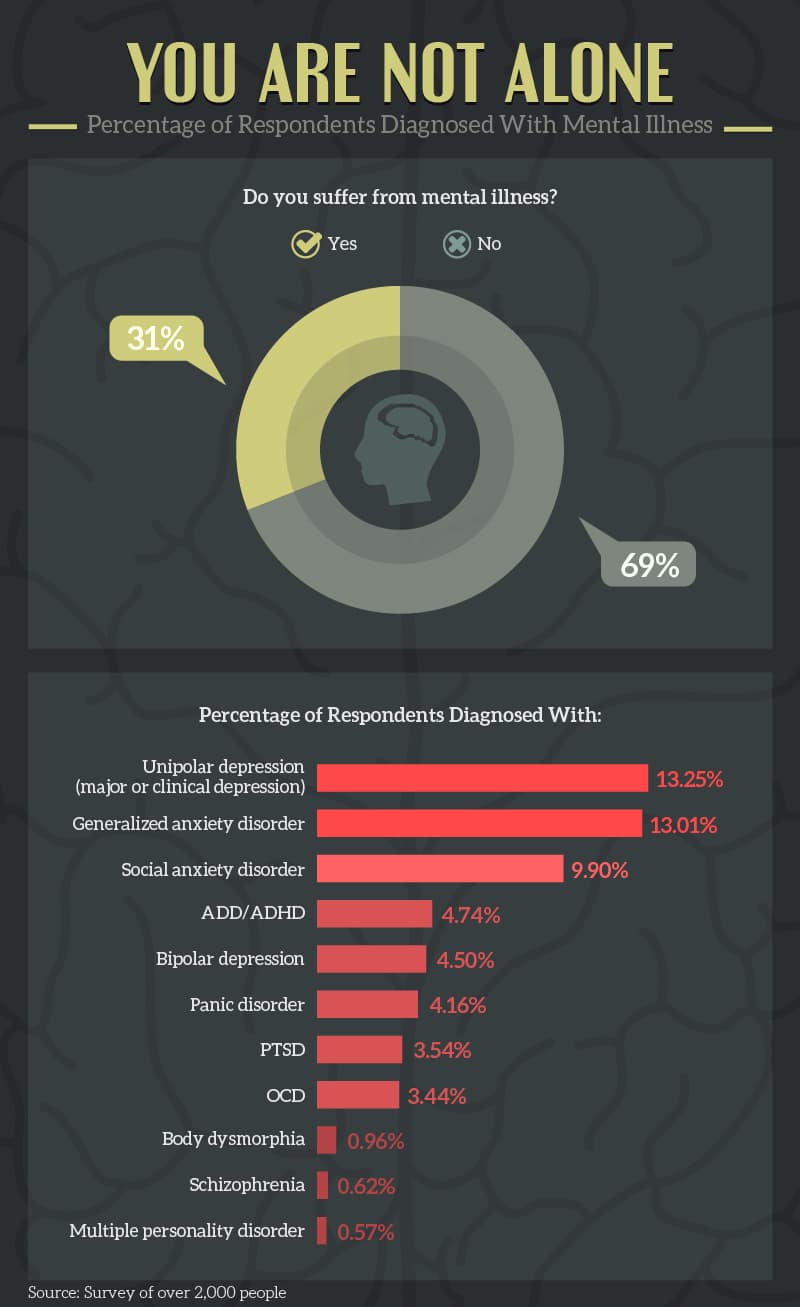
Nearly one-third of the 2,000 people we surveyed indicated that they had been diagnosed with a mental illness. Close to 27 percent indicated they were suffering from a form of anxiety, such as generalized anxiety disorder (13 percent), social anxiety disorder (almost 10 percent), or obsessive-compulsive disorder (more than 3 percent).
Generalized anxiety disorder is the feeling of constantly being worried without reason. Obsessive-compulsive disorder (OCD) is the urge to repeatedly complete tasks, even if they only need completing once (e.g., washing hands multiple times). Social anxiety disorder is the fear of social situations and being judged, which can potentially prevent people from participating in daily life outside of their home.
Unlike an anxious moment – before opening a college admissions letter or waiting for those three dots in a text message to ultimately deliver the words, “I love you too,” for the first time – these individuals experience persistent, potentially debilitating, levels of anxiety. Ignoring the problem isn’t the answer; rather, these individuals require a solution tailored to their needs.
Beliefs vs. Realities
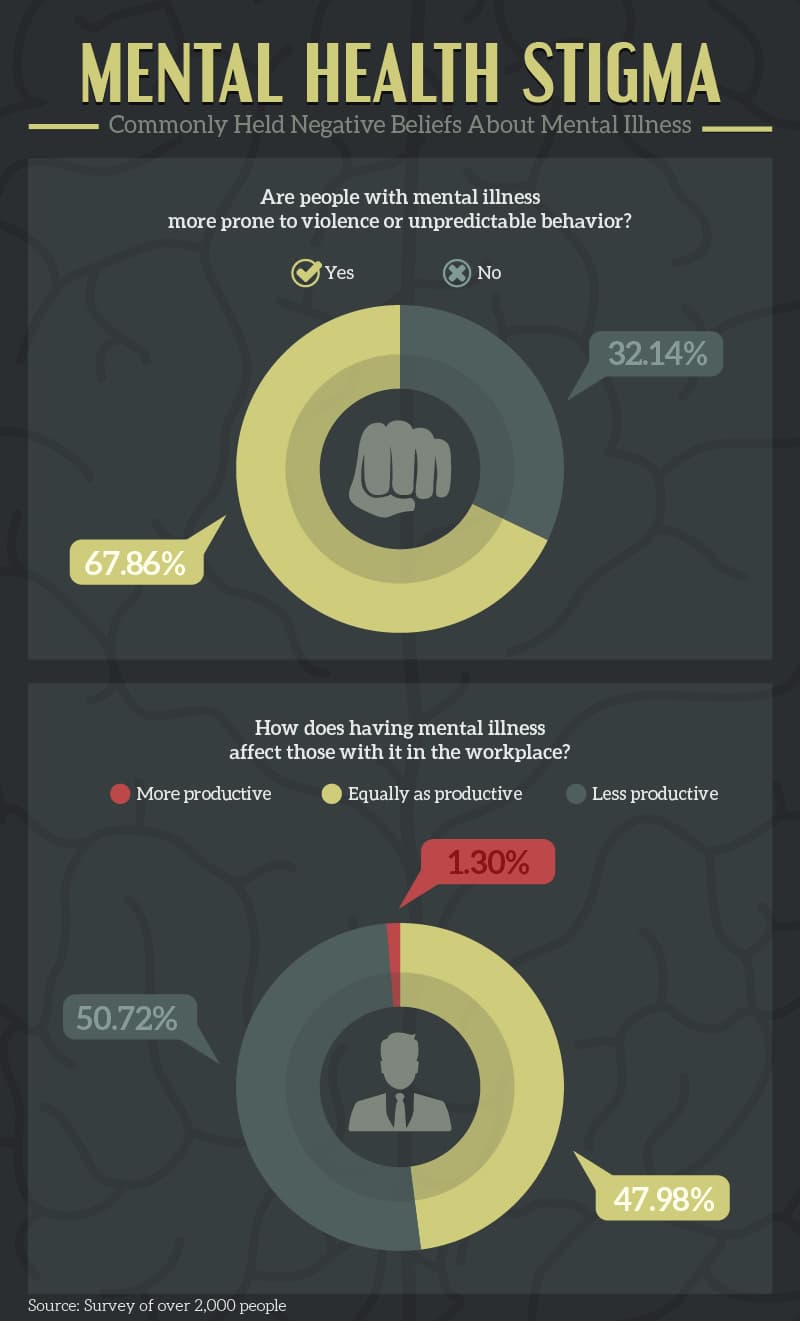
Many people perceive those with a mental illness as individuals with a collection of negative traits. It is often difficult to recognize that behaviors associated with mental health conditions vary and are often not personality traits, but side effects of a mental health condition. When conducting this survey, we first asked, “Are people with mental illness more prone to violence or unpredictable behavior?” Almost 68 percent said yes. While a few prominent public figures have spoken out about mental illness, misunderstandings of mental illness still persist.
Companies have been perceived to be less likely to hire employees suffering from a mental illness. There are even examples of employees being coached to hide their mental illness because of how it made their coworkers or bosses feel. While this stigma continues to exist in the workplace, we see from our survey that some progress has been made. There are even examples of companies creating programs to help their employees identify if a coworker might be emotionally distressed. Slightly less than 48 percent felt those with a mental illness were as productive as those without, while about 51 percent felt they were less productive (roughly 1 percent felt they were more productive). While these responses reveal some open-mindedness for struggling co-workers, it highlights the need for further education to dispel misunderstandings about mental health conditions.
You Don’t Know, But Now You Know
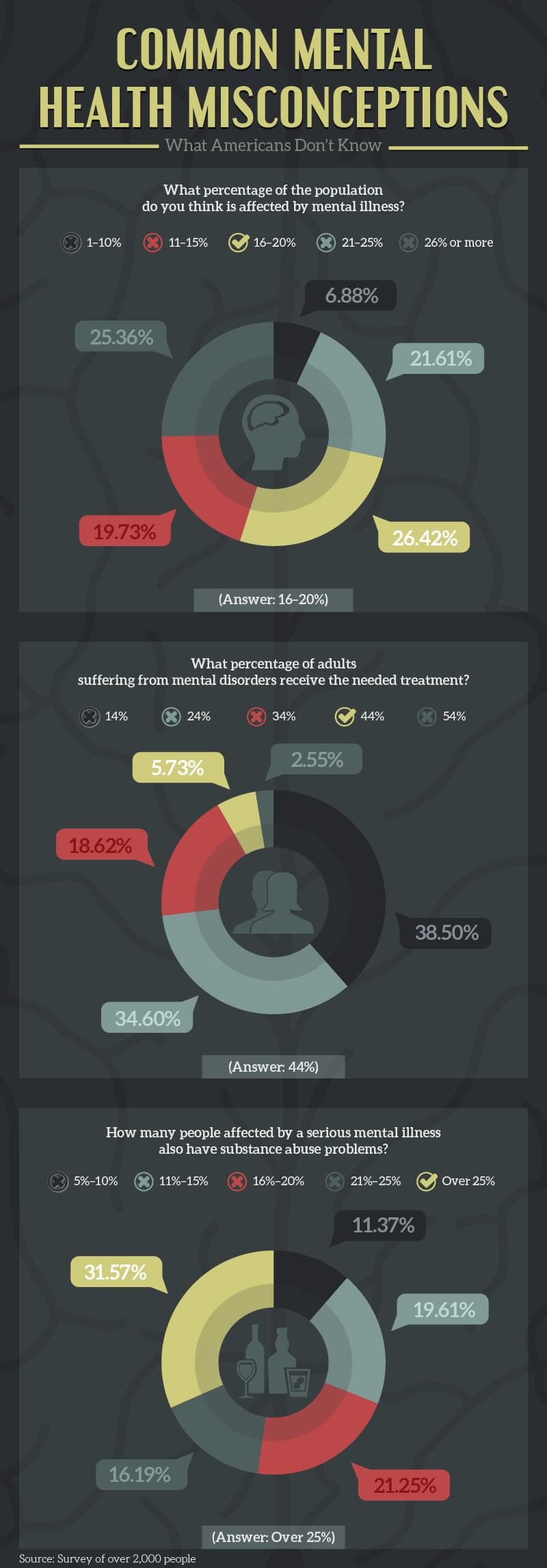
Challenging some of the most common misconceptions, we asked questions related to the number of adult Americans diagnosed with a mental illness, the percent receiving treatment, and how many were also suffering from substance abuse problems. The following questions were asked during the survey:
• What percentage of the population do you think is affected by mental illness?
• Mental illness is only treatable with medication, true or false?
• One can snap out of depression or bipolar disorder by simply thinking positive, true or false?
• How many people affected by a serious mental illness also have substance abuse problems?
• Symptoms of a less common mental disorder, schizophrenia, generally appear between what ages?
• What percentage of adults suffering from mental disorders receive the needed treatment?
In each of the questions, our respondents answered incorrectly more than they answered correctly. In fact, 94 percent of respondents answered incorrectly when asked what percentage of adults suffering from mental health disorders receive the needed treatment. Though 44 percent of adults suffering from mental illness receive professional help, the National Institute of Mental Health states that most people experiencing symptoms wait nearly a decade before seeking the appropriate treatment.
According to the National Alliance on Mental Illness, only around one-third of those experiencing mental illness and nearly half of those with severe mental illness experience a “dual diagnosis” (defined as someone who is simultaneously plagued by both a substance abuse problem and a mental illness). This is just another misconception that plays into the negative stereotypes surrounding mental illness in America – not everyone suffering from mental illness, nor even the majority, experience drug addiction.
Misinformed America
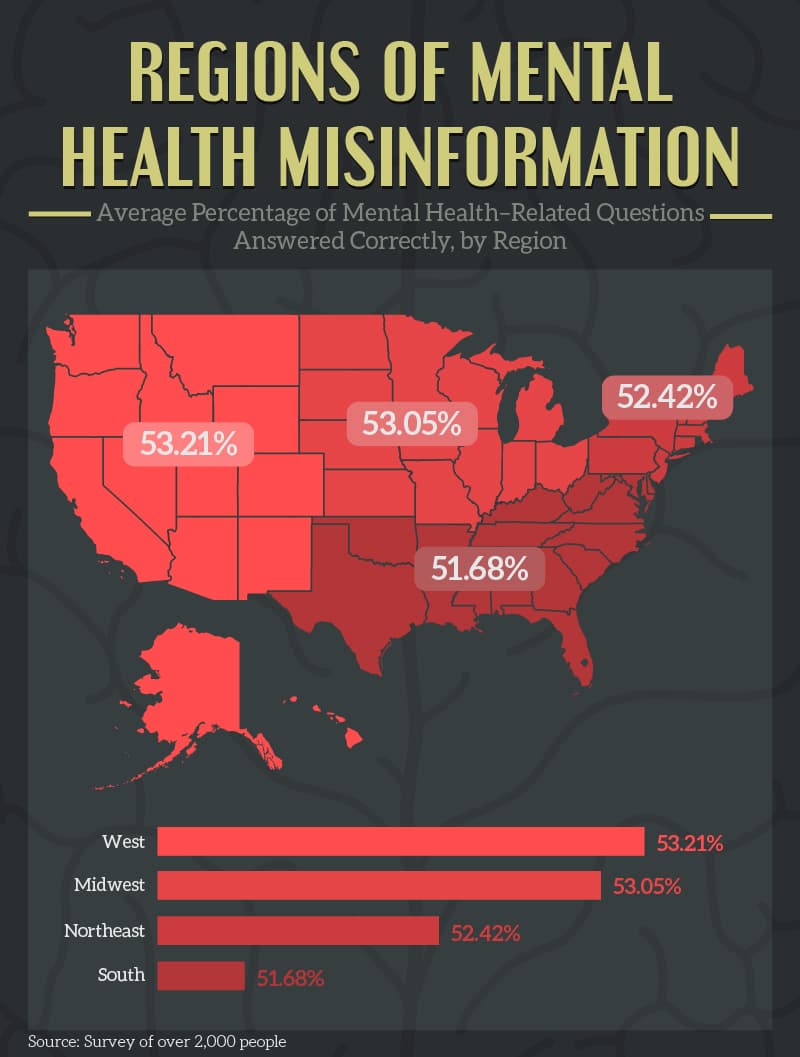
When we look at our respondents by region, we see that not one group earned a passing score when asked mental health-related questions. In fact, if we treated this like a test with letter grades, they all failed. The west region scored the highest percentage of correct answers (53.21%), and the south finished last answering only 51.68% of the questions correctly.
Assessing the Knowledge Gaps

Reviewing the demographic information of the survey participants, we identified those who were more or less knowledgeable in regard to understanding mental health illnesses. Females, regardless of age group or region, performed better than males by more than 4 percent.
While females slightly outperformed males in awareness of mental illness, it’s clear that mental health education is needed across demographics and age groups. At PsychGuides.com, we offer resources (on topics such as anxiety and depression) that explain mental health conditions, treatment strategies, and locations of trusted providers. Information can help eliminate misconceptions and better support those in need, letting them know that seeking help is not a sign of weakness.
Depression, More Than Being Sad
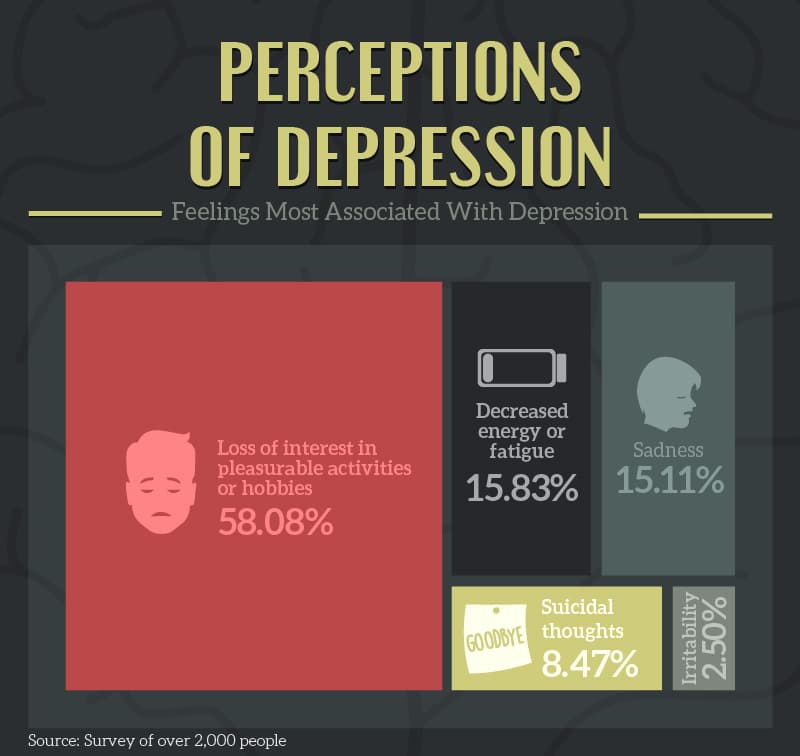
In 2014, almost 7 percent of all adult Americans (18 years of age and older) experienced a major depressive episode. That was close to 16 million individuals experiencing one or more of the symptoms – lack or loss of interest in activities/hobbies, decreased energy and/or fatigue, sadness, suicidal thoughts, irritability – that our respondents commonly associate with depression. These are symptoms that, by themselves, might be mistaken as someone having a bad night’s rest or not getting their morning cup of coffee. Without the proper education and awareness to what depression actually looks like, it could be easy miss helping a friend or loved one get the help they need.
With the multitude of types of depression, it is hard to prescribe treatment solutions in a cookie-cutter fashion. Instead, a customized plan based on the individual needs of a patient should be considered. If you or someone you know needs help in their battle with depression, call Psychology Guide’s free, confidential hotline – – to connect with the best local support recommendations available.
Feelings About Manic Depression
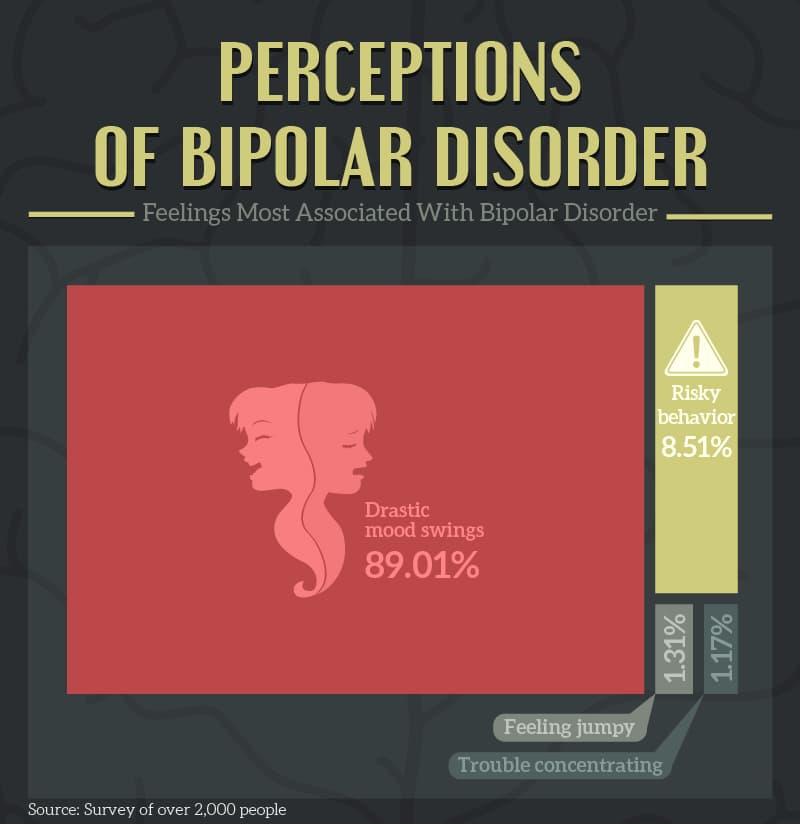
Our knowledge of bipolar disorder (also known as manic-depressive illness) and its displayed symptoms and treatment might be defined by popular TV shows or movies, such as Showtime’s “Homeland” lead character Carrie Mathison (Claire Danes) and Pat Solitano Jr. (Bradley Cooper) of “Silver Linings Playbook.” However, Hollywood struggles to accurately depict both the challenges of manic-depressive illness and how it’s treated. This can be seen in the results of our survey, where almost 90 percent of respondents associated drastic mood swings with bipolar disorder.
You may not know that there are four basic types of bipolar disorder – bipolar I disorder, bipolar II disorder, cyclothymia, and specified/unspecified – with varying displayed intensity of changes in mood and in energy and activity levels. Treatment plans also don’t rely solely on medications, but also on solutions like cognitive therapy, wherein patients work to retrain how they respond to situations.
Where We Need to Go
There’s no need for uneducated opinions or preconceived beliefs related to mental illness to incorrectly define those living with a mental health condition. With resources like Psychology Guides, not only can you expand your understanding of the challenges those with certain disorders are facing and help them connect with treatment solutions as well. Working toward a more inclusive and supportive society means all of us – together – must take steps toward understanding mental health conditions and offering a receptive environment for those suffering. Only then will those in need feel comfortable enough to share openly, knowing that they’ll be greeted by help, love, and care.
Methodology
We surveyed more than 2,000 people about their knowledge and awareness regarding issues of mental health.
Sources
http://www.salon.com/2013/02/05/misdiagnosing_bipolar_disorder_in_tv_and_movies_partner/
https://www.psychguides.com/guides/bipolar-disorder-treatment-program-options/
http://www.nami.org/Learn-More/Mental-Health-Conditions/Related-Conditions/Dual-Diagnosis
http://www.usatoday.com/story/news/nation/2014/06/25/stigma-of-mental-illness/9875351/
https://www.nimh.nih.gov/health/topics/anxiety-disorders/index.shtml
https://www.mentalhealth.gov/basics/myths-facts/ <
http://www.nimh.nih.gov/health/statistics/prevalence/major-depression-among-adults.shtml

